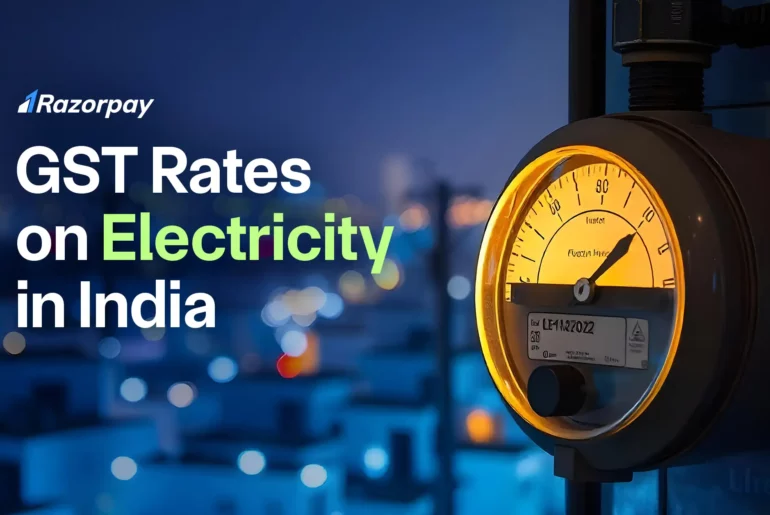The introduction of the Goods and Service Tax (GST) regime in India has brought about significant changes in the taxation structure across various sectors. One area that has been a subject of confusion and debate is the applicability of GST on electricity supply. As electricity is a crucial commodity for both businesses and households, understanding the GST rates and exemptions on electricity is essential. In this article, we will delve into the details of GST for electricity and explore how it impacts consumers and businesses alike.
Table of Contents
Does GST Apply To Electricity Supply Goods And Services?
Under the GST Act, goods are defined as movable properties, actionable claims, crops, and other assets attached to the land that need to be extracted before sale. Electricity, being a movable property, falls under the category of goods. This classification has a direct impact on how electricity GST is levied.
The supply of electricity is considered a good under the GST Act, which means that it is subject to GST rates based on the applicable slabs. However, it is important to note that the current taxation structure for electricity has certain exemptions and specific provisions.
The Current Taxation Of Electricity Production And Distribution
As per Notification 02/2017 (Central Tax), issued on 28th June 2017, the supply of electricity is exempt from GST. This exemption covers all forms of electrical energy, including thermal, solar, hydropower, and other sources.
Furthermore, Notification 12/2017 exempts services provided by electricity transmission or distribution utilities, such as state electricity boards, from GST. This means that the distribution and transmission of electricity by these entities are not subject to GST on electricity bills.
However, if any individual or entity other than an electricity transmission or distribution utility supplies electricity, a GST rate of 18% is applicable. This provision ensures that private suppliers of electricity are brought under the GST net.
Prior to the implementation of GST, electricity supply was exempt from Value Added Tax (VAT) in each state, and services provided by electricity distribution and transmission utilities were exempt under the Service Tax Act.
Advantages of bringing electricity into GST
1. Reduced manufacturing costs:
By allowing input tax credit on GST for electricity, businesses can offset the GST paid on electricity against their output GST liability, ultimately reducing their manufacturing expenses.
2. Enhanced competitiveness:
The inclusion of electricity in the GST regime helps improve the competitiveness of exporters and Indian businesses by streamlining the taxation process and reducing cascading effects.
3. Minimised cross-subsidies:
GST in electricity bills helps minimise the cross-subsidies applicable on electricity charges, which previously affected the competitiveness of manufacturers and exporters.
4. Neutral incentives:
The introduction of GST for electricity eliminates large biases and restores neutral incentives across the board, creating a level playing field for businesses.
Moreover, the revenue generated from GST on electricity is shared between the central government and the respective state governments, replacing the state-specific charges that were previously levied on electricity supply.
Possible Interpretations for GST Treatment on Electricity Supply
In real-life scenarios, the applicability of GST on electricity supply can vary based on the nature of the transaction. Let’s consider a common example of landlords charging tenants for electricity.
When electricity charges are bundled with rent and other services provided by the landlord, it is considered a composite supply. In such cases, the principal supply (rent) attracts GST, while the electricity charges, being naturally bundled with the rent, are subject to the same GST rate.
However, if the landlord collects electricity charges as a “pure agent” without any profit margin, GST does not apply to those charges. The landlord must provide the original electricity bills to the tenant and collect the exact amount without any markup.
Conclusion
The applicability of GST on electricity has been a topic of discussion since the introduction of the GST regime. While electricity is considered a good under the GST Act, the supply of electricity currently remains exempt from GST. This exemption extends to services provided by electricity transmission and distribution utilities as well.
Businesses stand to benefit from the inclusion of electricity under GST, as it can help reduce manufacturing costs, enhance competitiveness, and create a level playing field. However, the treatment of GST on electricity supply in various scenarios, such as composite supplies and pure agent transactions, requires careful consideration.
As the GST landscape continues to evolve, it is essential for consumers and businesses to stay informed about the latest developments and seek clarification from tax experts when needed.
Frequently Asked Questions (FAQs):
1. Is there any GST on electricity?
Currently, the supply of electricity is exempt from GST as per Notification 02/2017 (Central Tax) dated 28th June 2017.
2. What is the GST rate for electric service?
If electricity is supplied by an individual or entity other than an electricity transmission or distribution utility, a GST rate of 18% is applicable.
3. Can we claim GST input on an electricity bill?
Businesses cannot claim input tax credits on electricity bills as the supply of electricity is exempt from GST.
4. What tax is levied on electricity?
Electricity is subject to taxes levied by state governments under the State List of the Constitution. These taxes are not subsumed under GST and continue to be levied by the respective state governments.


